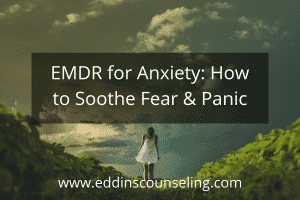December 4, 2018
EMDR for Anxiety: How to Soothe Fear & Panic
Written by Rachel Eddins

On the news or internet, we’re constantly hearing that fear and anxiety are on the rise. And between the headlines and commentary, most us are inclined to agree. Fortunately, the anxiety trend is also inspiring an ever-growing range of treatment options for those of us who struggle most. This includes eye movement desensitization and reprocessing therapy (EMDR). Before exploring EMDR for anxiety, let’s explore a brief anxiety overview.
The Age of Anxiety
Some 40 million adults in the U.S. — more than half of them, women — are impacted by anxiety disorders, making it the nation’s most common mental illness. Even with nearly one-fifth of the adult population dealing with this condition, less than 40 percent of sufferers seek treatment.
Anxiety disorders include:
- Generalized Anxiety Disorder
- Panic Disorder
- Social Anxiety Disorder
- Specific Phobias
At least one-half of people with anxiety are also diagnosed with depression. Thus, other common disorders include obsessive-compulsive disorder and post-traumatic stress syndrome. The causes and risks factors for anxiety disorders vary widely. Life events loom large but there are also genetic and brain chemistry components.
Do you have symptoms of anxiety? Anxiety is the most common mental health concern. Take this self test and find out if anxiety could be impacting your life.
What is EMDR?
As the name implies, EMDR is based on rapid and rhythmic eye movements. This unique treatment characteristic allows your mind time to heal from a trauma. Think of it like covering a physical wound so it won’t be re-injured.
EMDR is not talk therapy and does not involve medication. Instead, the patient follows the therapist’s moving hand with their eyes. As this physical dynamic plays out, the therapist guides the patient through a series of recollections. These center both a traumatic event and the feelings that experience still evokes.
This treatment is believed to work based on the idea that the moving finger or hand helps the patient explore new thoughts about their trauma. Studies have patients report their level of distress prior to beginning treatment. The EMDR cycle continues until the distress level decreases. At this point, the patient is typically processing some new and positive information about their situation.
It’s believed that the EMDR eye movements, like the Rapid Eye Movements during sleep, can help people process upsetting memories.
 Why Choose EMDR for Anxiety?
Why Choose EMDR for Anxiety?
Since anxiety is so often triggered and exacerbated by our thoughts, EMDR is helpful in that it shifts the tone of such thoughts. For example, a therapist may ask the patient to verbalize a fearful or anxious thought. Adding to this, the patient conjures up a picture of how this thought or belief would manifest in real life. The patient rates their anxiety level and the hand/eye movement begins.
During the treatment, the patient conjures up a new thought — something they’d prefer to the anxiety-inducing thought. The patient repeats this new thought and discusses how it will look when it comes to being. They do this, following the therapist’s hand movements with their eyes.
This process de-escalates the feeling of anxiety. Slowly the fearful image is replaced with an equally intense positive image. The patient ends the session fully focused on the positive alternative. They usually find their distress level rating drops dramatically.
Another anti-anxiety factor of EMDR is the brevity of treatments. The sessions themselves might be 60 to 90 minutes but patients feel results sooner than with other treatment. Consequently, the number of treatments needed may be as low as 5 or 6.
Start EMDR for Anxiety with a Therapist
EMDR is a specialized form of treatment, but it’s no longer uncommon. For starters, search for an experienced and qualified therapist in your neck of the woods. Set up a consultation. Get the information and face-to-face reassurance you need. Anxiety disorders are common and can lead to depressive disorders. Addressing this cycle before it advances is just a phone call away. No medication and no long commitment to talk therapy is required.
Eddins Counseling Group in Houston, TX has several therapists that specialize in EMDR therapy. Call us at 832-559-2622 or book an appointment online.
5 Ways to Reduce Anxiety
Get instant access to your free ebook.
Grounding & Self Soothing
Get instant access to your free ebook.
Create Healthier Thoughts & Feelings
Get instant access to your free ebook.
Why You Feel This Way
Get instant access to your free ebook.
















